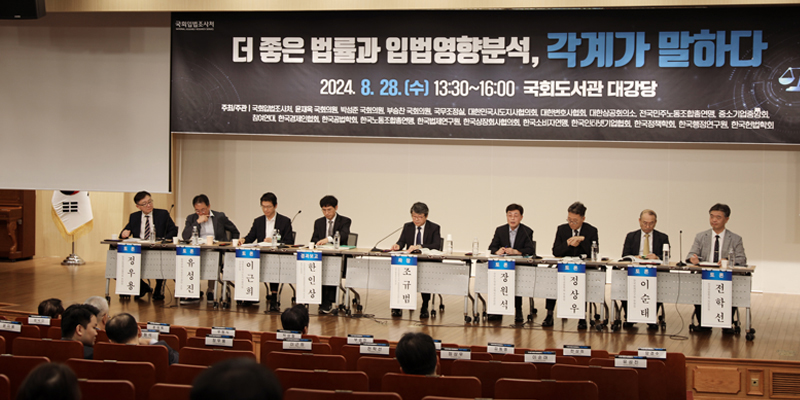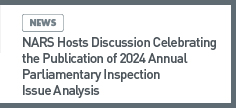
On Wednesday, August 28, 2024, the National Assembly Research Service (Chief Park Sang-chul) held a seminar titled “Better Laws and Legal Impact Analysis with Experts from Various Fields” at the hall of the National Assembly Library. The seminar was jointly convened by 21 institutions including National Assembly members Yun Jae-ok, Park Sung-joon, and Boo Seung-chan, who proposed a bill to enact Legislative Impact Analysis (LIA). The seminar sought to conduct in-depth discussion on the enactment and practical implementation of the LIA.
There is a consensus among the 22nd National Assembly that LIA should be adopted to meet the public’s growing expectation for better legislation.
NARS Chief Park Sang-chul emphasized that LIA is one of the ways to work toward better legislation, and better laws can be formulated when a bill is made in consideration of its effects on the public and society as a whole and the message it carries to the future generation and the international community.
Woo Wun-shik, Speaker of the National Assembly, elaborated on the meaning of LIA in his congratulatory remarks, mentioning that enacting LIA can improve the quality of legislation and raise the effectiveness of consideration of bills by fully taking into account during the legislation the complexity and differing values of the society, economy, interested parties, and various technological changes.
At the event, keynote speaker Dr. Sung Nak-in (Former President of Seoul National University) emphasized the need for an objective and systematic LIA before National Assembly members propose bills, the number of which have increased dramatically since the democratization. The proposal of bills is increasing proportional to the phenomena taking place in society these days: areas are becoming increasingly specialized, political and diplomatic tensions are increasing, wars and armed conflicts are rising, and global supply chains are being transformed, not to mention the complexities, changes, and pressures brought about by the Fourth Industrial Revolution, artificial intelligence, and climate change. This can lead to a situation where, under a busy parliamentary calendar, bills are reviewed without proper debate or alternatives. He also added that LIA can serve as a means to ensure legislators’ right to legislate in practice, as LIA enables legislators to identify preemptively the comprehensive impact of a bill once it is enacted so that they can fully prepare for future committee reviews and the press.
The third panel was chaired by Cho Kyu-beom, Director of the Legislative Impact Analysis Division at the NARS, and Deputy Director Han In-sang made a presentation on the progress of LIA. This was followed by a discussion. To discuss how to introduce LIA, its relevant acts, and what should be prescribed in a bill, several experts joined as panelists including Jang Won-seok (Director General, Regulatory Assessment Management at the Office for Government Policy Coordination), Lee Kun-hee (Deputy Secretary-General, Governors Association of Korea), Yu Seong-jin (Head of the Center for Legislative Watch from the People’s Solidarity for Participatory Democracy), Jeong Sang-woo (Vice Chairman, Korean Public Law Association), Lee Sun-tae (Vice President, Korea Legislation Research Institute), Jeong Woo-young (Vice Chairman, Korea Listed Companies Association), and Jeon Hak-seon (Advisor, Korean Constitutional Law Association).
There is a consensus among the 22nd National Assembly that LIA should be adopted to meet the public’s growing expectation for better legislation.
NARS Chief Park Sang-chul emphasized that LIA is one of the ways to work toward better legislation, and better laws can be formulated when a bill is made in consideration of its effects on the public and society as a whole and the message it carries to the future generation and the international community.
Woo Wun-shik, Speaker of the National Assembly, elaborated on the meaning of LIA in his congratulatory remarks, mentioning that enacting LIA can improve the quality of legislation and raise the effectiveness of consideration of bills by fully taking into account during the legislation the complexity and differing values of the society, economy, interested parties, and various technological changes.
At the event, keynote speaker Dr. Sung Nak-in (Former President of Seoul National University) emphasized the need for an objective and systematic LIA before National Assembly members propose bills, the number of which have increased dramatically since the democratization. The proposal of bills is increasing proportional to the phenomena taking place in society these days: areas are becoming increasingly specialized, political and diplomatic tensions are increasing, wars and armed conflicts are rising, and global supply chains are being transformed, not to mention the complexities, changes, and pressures brought about by the Fourth Industrial Revolution, artificial intelligence, and climate change. This can lead to a situation where, under a busy parliamentary calendar, bills are reviewed without proper debate or alternatives. He also added that LIA can serve as a means to ensure legislators’ right to legislate in practice, as LIA enables legislators to identify preemptively the comprehensive impact of a bill once it is enacted so that they can fully prepare for future committee reviews and the press.
The third panel was chaired by Cho Kyu-beom, Director of the Legislative Impact Analysis Division at the NARS, and Deputy Director Han In-sang made a presentation on the progress of LIA. This was followed by a discussion. To discuss how to introduce LIA, its relevant acts, and what should be prescribed in a bill, several experts joined as panelists including Jang Won-seok (Director General, Regulatory Assessment Management at the Office for Government Policy Coordination), Lee Kun-hee (Deputy Secretary-General, Governors Association of Korea), Yu Seong-jin (Head of the Center for Legislative Watch from the People’s Solidarity for Participatory Democracy), Jeong Sang-woo (Vice Chairman, Korean Public Law Association), Lee Sun-tae (Vice President, Korea Legislation Research Institute), Jeong Woo-young (Vice Chairman, Korea Listed Companies Association), and Jeon Hak-seon (Advisor, Korean Constitutional Law Association).

